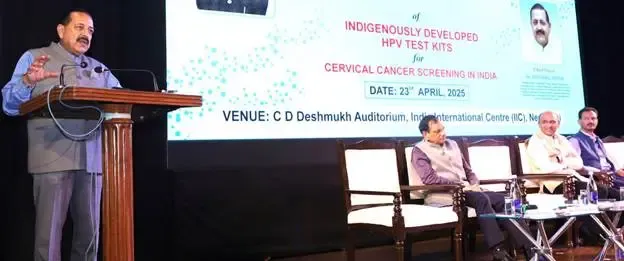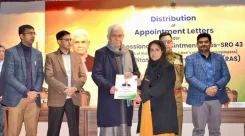A Pivotal Moment for India to Lead in Preventive Healthcare: Dr Jitendra Singh

Synopsis
Key Takeaways
- India has 25 percent of global cervical cancer deaths.
- Need for preventive screening strategies is urgent.
- India ranks fourth globally in cervical cancer morbidity.
- First-ever DNA vaccine developed, enhancing India's reputation.
- Public-Private Partnerships are key to success.
New Delhi, April 23 (NationPress) With 25 percent of global cervical cancer fatalities occurring in India -- frequently attributed to delayed diagnosis -- there exists a pressing necessity for preventive screening strategies, stated Union Minister Dr Jitendra Singh on Wednesday. He emphasized that the overarching aim is to establish India as a global leader in preventive healthcare.
Dr Singh held a collaborative meeting with the Department of Biotechnology (DBT), AIIMS New Delhi, BIRAC, ICMR, and industry stakeholders to assess the domestically produced HPV test kits for cervical cancer screening in India, calling it another significant achievement in preventive healthcare facilitated by the DBT under the Ministry of Science and Technology.
He pointed out that India ranks fourth globally in terms of cervical cancer morbidity, highlighting the urgent call for action. He noted that although HPV is not the exclusive cause of cervical cancer, research indicates a 90 percent correlation, reinforcing the importance of targeted prevention.
The minister asserted that the ultimate goal is to make cervical cancer screening affordable, accessible, and ideally widespread.
Furthermore, he acknowledged a series of remarkable milestones achieved by the DBT and BIRAC, including the creation of the first-ever DNA vaccine, which has brought India international acclaim and renewed respect for Indian science in healthcare.
“The DNA vaccine has positioned India as a nation capable of leading in preventive healthcare — a sharp departure from the outdated view that India neglected both preventive and curative healthcare,” remarked Dr Singh.
He also mentioned Nafithromycin, India’s first homegrown antibiotic, which has garnered positive feedback.
Dr Singh reiterated that the participation of the private sector is crucial to these achievements, emphasizing a whole-of-science and whole-of-government approach.
Another notable advancement mentioned was the successful gene therapy trial in hemophilia, which was published in the esteemed New England Journal of Medicine (NEJM). Both the British Medical Journal and NEJM, among the world’s oldest medical journals, have recognized India’s trailblazing healthcare research.
The minister introduced the term “PPP plus PPP,” referring to Public-Private Partnerships both domestically and internationally, a model successfully utilized by various European countries, especially in life sciences and healthcare.










